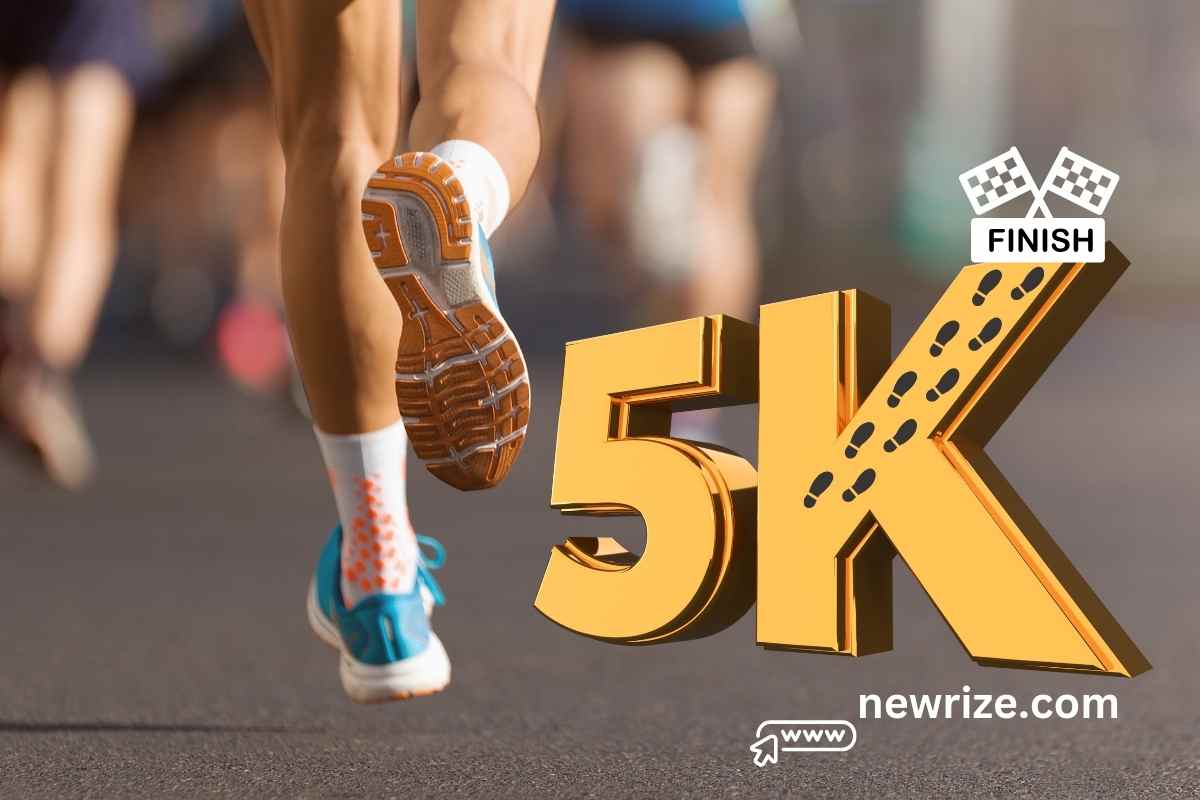Running 5K is one of the most popular racing goals for beginners and experienced runners worldwide. But if you’re new to running, you might be wondering: how many miles is a 5K? If you’re preparing for your first race or just interested about the distance, this guide will cover everything you need to know about 5K races, from conversion to training suggestions, benefits, and expert advice to improve your performance.
A 5K run is an excellent way to get into running because it is a manageable distance that doesn’t require months of preparation. It is great for casual runners, those interested in fitness, and even those seeking to join in charity or local community races.
How Many Miles Is a 5K?
A 5K race is equivalent to 5 kilometers, which is 3.1 miles. Here’s a simple breakdown:
- 1 kilometer = 0.621 miles
- 5 kilometers × 0.621 miles = 3.1 miles

To visualize, a 5K is approximately the same as running around a standard 400-meter track 12.5 times. This makes it a convenient race length.
If you are running in a neighborhood, a 5K distance is roughly the length of 50 football fields or about the same as a 25-minute drive in a car at highway speed. Understanding the actual distance can help you set realistic goals and pace yourself accordingly.
Read Also: Harley-Davidson Special City Cruiser 2025
How Many Miles Is 5K in Steps?
The number of steps it takes to complete a 5K depends on a person’s stride length. Here’s an estimate:

| Walking/Running Pace | Average Steps Per Mile | Steps in a 5K (3.1 miles) |
|---|---|---|
| Walking (Slow) | 2,000–2,500 steps | 6,200–7,750 steps |
| Walking (Brisk) | 1,800–2,200 steps | 5,600–6,820 steps |
| Jogging | 1,500–1,700 steps | 4,650–5,270 steps |
| Running (Fast) | 1,200–1,400 steps | 3,720–4,340 steps |
- Taller individuals with longer strides will take fewer steps.
- Shorter individuals with shorter strides will take more steps.
- Running efficiency and terrain can also affect step count.
If you want to track your exact steps, using a fitness tracker or smartphone app is a great option!
Why Is a 5K Race So Popular?
Because it is suitable for runners of all skill levels, a 5K race attracts a large crowd every year. If you want to get in better shape or set new running objectives, this race is for you because it’s hard but not impossible. Because it just takes a few weeks to train for a 5K, nearly anyone can do it, unlike marathons and half-marathons, which need months of hard training.

Charity events, corporate wellness programs, and community gatherings are common venues for 5K races, which further adds to the social aspect and serves as a source of incentive for participants. One of the most popular race distances globally is the 5K, which is perfect for anyone who wants to test their boundaries, be active, or just have fun.
1. Perfect for Beginners
A 5K race is an ideal starting point for new runners because it is a manageable yet rewarding challenge. Unlike marathons that require months of preparation, a 5K can be trained for in just a few weeks, making it less intimidating for beginners.
2. Quick and Time-Efficient
A 5K race takes between 20 to 40 minutes for most runners, making it a short but effective workout. Since training sessions are also relatively brief, even those with busy schedules can commit to preparing for a 5K without significant lifestyle changes.
3. Great for Fitness and Health
Running a 5K improves cardiovascular endurance, burns calories, and strengthens muscles. It’s a great way to stay active and build a running habit without the risk of overtraining, which is more common in longer races.
4. Fun and Social Experience
Many 5K races are themed, charity-based, or held as community events, making them fun and engaging. Whether it’s a color run, a glow run, or a corporate challenge, these races bring people together for a shared fitness goal.
5. Easy to Find and Participate In
Since 5K races are organized frequently in cities and local communities, they are accessible to almost everyone. With minimal cost and preparation needed, anyone can sign up and experience the thrill of crossing the finish line!
How Long Does It Take to Run a 5K?
The time it takes to complete a 5K varies based on fitness level, age, and running experience. Here’s a general estimate:
| Runner Level | Average Time |
|---|---|
| Beginner | 30–40 minutes |
| Intermediate | 20–30 minutes |
| Advanced | Under 20 minutes |
| Professional | Around 15 minutes or less |
- Walking a 5K – If you prefer walking, a 5K will take about 45 minutes to 1 hour.
- Jogging a 5K – A casual jogger can complete a 5K in 25–35 minutes.
- Running a 5K – A trained runner may finish in 18–25 minutes.
Your time will depend on your pace and consistency in training.
5K Training Tips for Beginners
Preparing for a 5K race requires the right approach to build endurance, improve speed, and prevent injuries. Whether you’re a complete beginner or someone looking to improve your time, following a well-structured plan can make a huge difference. Training for a 5K doesn’t have to be overwhelming by focusing on consistency, proper technique, and gradual progression, you can confidently reach the finish line. Here are some essential tips to get you started:
1. Follow a Structured Training Plan
A proper training plan will help you improve gradually without risking injury. Here’s an 8-week beginner training plan:
| Week | Training Plan |
|---|---|
| 1–2 | Walk and jog mix (30-minute sessions, 3–4 times a week) |
| 3–4 | Increase jogging time, reduce walking |
| 5–6 | Run continuously for longer periods, focus on breathing |
| 7–8 | Run 3.1 miles in one go before race day |
2. Wear the Right Gear
- Invest in a comfortable, well-cushioned pair of running shoes that suit your foot type.
- Wear breathable, moisture-wicking clothing to prevent discomfort.
3. Warm-Up and Cool Down
- Always stretch before and after running to prevent muscle tightness and injuries.
4. Stay Hydrated and Eat Well
- Drink plenty of water before and after your run.
- Focus on carbohydrates for energy and protein for muscle recovery.
5K vs. Other Race Distances
Curious about how a 5K compares to other common races? Here’s a quick comparison:
| Race Distance | Kilometers | Miles |
|---|---|---|
| 5K | 5 km | 3.1 mi |
| 10K | 10 km | 6.2 mi |
| Half Marathon | 21.1 km | 13.1 mi |
| Marathon | 42.2 km | 26.2 mi |
If you’re interested in running longer distances and want to start with a 5K, 10K, half-marathon, or full marathon, that’s a great choice. Building endurance, perfecting running technique, and comprehending racing plans are all set out in its strong base. Beginners can ease into a regular running program with shorter events because they require less training time than longer races. Also, finishing a 5K gives you a confidence boost, which makes longer runs seem easier. Many runners discover that going from 5Ks to larger events is a natural and satisfying development when they progressively increase their mileage and embrace disciplined preparation.
Common Questions About Running a 5K
1. Can I Walk a 5K Instead of Running?
Yes! Many people walk a 5K, which usually takes 45–60 minutes. Walking a 5K is a great way to stay active without high-impact joint stress.
2. What Is a Good 5K Time for a Beginner?
A good beginner time is between 30–40 minutes, but your pace may vary based on fitness level and experience.
3. How Can I Run a Faster 5K?
Incorporate interval training to build endurance and speed.
Strengthen your legs with squats, lunges, and core workouts.
Follow a consistent training plan to improve pace over time.
4. Do I Need Special Shoes for a 5K?
Yes, wearing proper running shoes can help prevent injuries and improve comfort. Visit a running store to get fitted for the best pair for your feet.
5. What Should I Eat Before a 5K?
Eat a light meal or snack high in carbohydrates about 30–60 minutes before running. Good options include bananas, oatmeal, or toast with peanut butter.
6. What Should I Do After Completing a 5K?
Cool down with a slow jog or walk for 5–10 minutes. Hydrate and refuel with a mix of protein and carbs.
Conclusion: Should You Run a 5K?
Absolutely! Running a 5K is an excellent way to improve your fitness, raise your mental health, and enjoy the excitement of a race. Whether you are new to running or an experienced runner. It’s an easy distance that doesn’t require months of intense exercise, making it a realistic goal for anyone wishing to start jogging. Furthermore, the sense of satisfaction you’ll experience after crossing the finish line is unparalleled!

A 5K is an excellent starting point for anyone looking to lose weight, develop endurance, or simply enjoy the excitement of running. With so many neighborhood races, charity events, and virtual runs to choose from, you’re sure to find a 5K that fits your schedule and inspires you to be active. So put on your running shoes, begin training, and take the first step towards your 5K journey today! 🚀
Let us know in the comments if you’re planning to run your first 5K or share your experience with past races!





